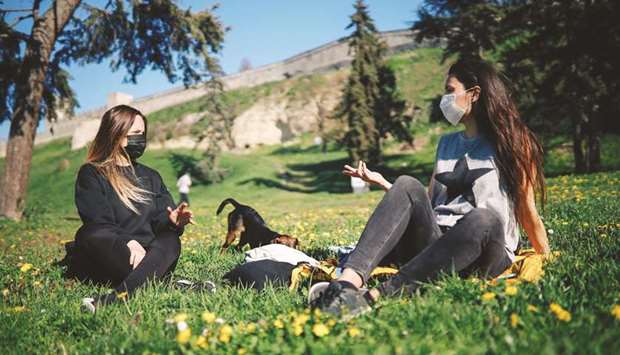The coronavirus pandemic has left us nervous, lonely – and critical of others. But are our concerns about our nearest and dearest always justified? And how should we tackle them if they are?
Covid restrictions have left many of us feeling torn between seeing friends and family and staying safe this year. Meeting others in person can feel fraught, especially when not everyone is adhering to guidance and restrictions. Meanwhile, 7.4 million people in the UK say that ‘lockdown loneliness’ has affected their wellbeing. According to psychologist and friendship expert Marisa Franco this can become a vicious cycle: “When we’re lonely, we are more critical of other people,” she says. “Evolutionarily, when we were lonely, we were separate from our tribe and in danger. Now, when we’re lonely, we’re not in the same kind of danger, but we still have that same physiological system where other people pose a threat of rejection.”
As we leave 2020, it is clear that coronavirus has made its mark on our relationships. But as the UK is no longer in lockdown, there may be more Covid-related confrontations to come – especially with friends who differ in their interpretation of or adherence to the rules imposed by the current tier system. But how do you deal with rule-breaking pals, or even just friends who have different Covid-related boundaries, without losing touch or causing offence?
Understand your own feelings first
If someone you care about does something that is at odds with your own boundaries, it is normal to feel strongly about it. “People try to suppress their feelings and then their feelings ambush them and leak out in ways that they are not in control of,” says Franco. Better to acknowledge these emotions before attempting to communicate them to the person in question. It might help to write your thoughts down or air them to a third party.
Start with questions
Consider why you believe your friend to be flouting the rules or acting irresponsibly. You may have seen a post on Instagram, or heard an offhand remark, but don’t assume you know the whole story. “You want to give them a chance to explain their side of things,” says Franco. Recognise that many people with good intentions may struggle to understand or stick to strict regulations. “Ask questions from a place of care about how they’re relating to the pandemic and its protocols.” Manhattan psychologist Joe Cilona says that “being extra-aware that not everyone is at their best, including you, can help foster a more realistic approach when addressing disagreements.”
Empathise
Is there a part of you that would love to break the rules and have a house party? Melanie Ross Mills, a relationship expert and host of The Life Bonds podcast, suggests taking a good hard look in the mirror before any confrontation. “Self-examining helps prevent hypocrisy, reduces a critical mindset, and produces compassion and empathy,” she says. Understanding that while your actions might be more restrained, your desires are similar, may make you reassess your feelings.
Don’t take it personally
“People who feel insecure and battle issues of self-worth will have a more difficult time not personalising other people’s boundaries and lifestyles in this pandemic,” says Franco. For example, if your friend is taking longer to reply to messages than usual, it could be because they are trying to minimise their screen time – but it’s easy to think their distance is a response to something you’ve done. Her advice is: “Lean on the default assumption that people like you, and they have other things going on in this very stressful time.”
At the same time, it is important to communicate your boundaries openly and honestly to your friends and family, even if you suspect they may be met with some resistance. “But when you do, I want you to use ‘I’ statements instead of ‘you’ statements,” says Franco. Swap accusatory language for authentic statements about your own experience. She suggests saying something along the lines of: “I would love to see you, but because of the ways that I’m relating to this pandemic, I’m not sure if I would feel comfortable seeing you in person.”
After you have set your boundaries, you can offer alternatives that you both feel comfortable with. This might be a socially distant walk with masks or baking a cake together via video call.
Stand firm
“Just because someone else is uncomfortable with your boundaries, doesn’t mean that you are wrong to set them in the first place,” says Franco. You may have been empathic and non-judgmental and still get a bad reaction from your friend. In this scenario, it is still important to “make an effort to stay in touch and continue to create memories and bond”, says Mills. “We need connection, now more than ever.”
Start planning for the future
You might not be able to get exact dates in the diary, but with the first vaccinations already taking place, a post-Covid world is on the horizon. Whether it is choosing a location for a beach holiday, perusing cottages for a weekend getaway with friends, or deciding your costume for your post-Covid celebration party, making plans for a later date can be a good way to stay connected with friends, and make clear that you are looking forward to seeing them in the future.

